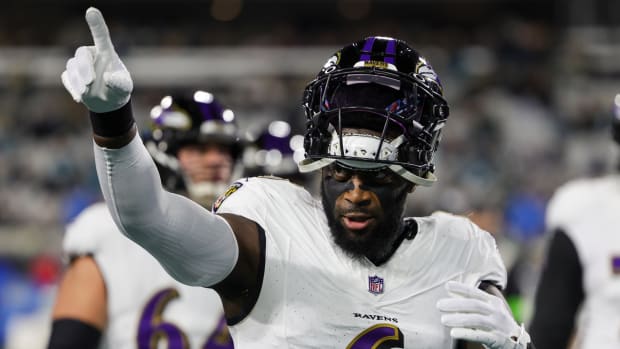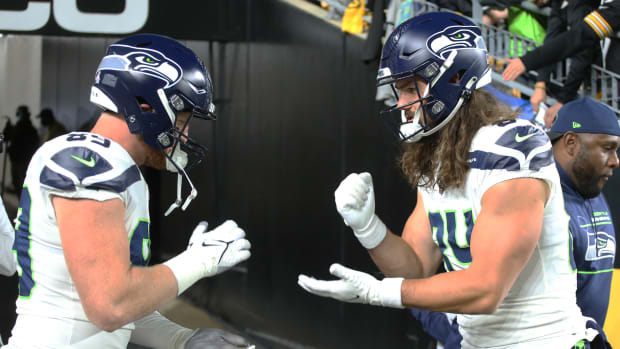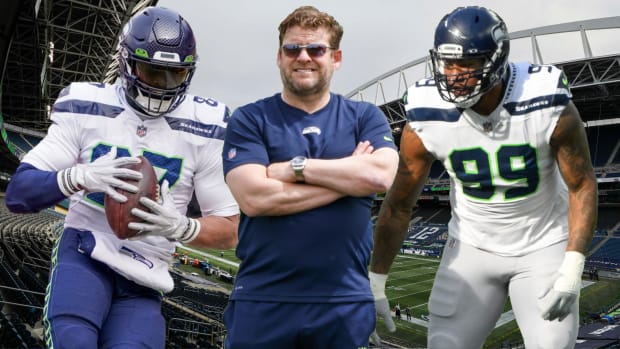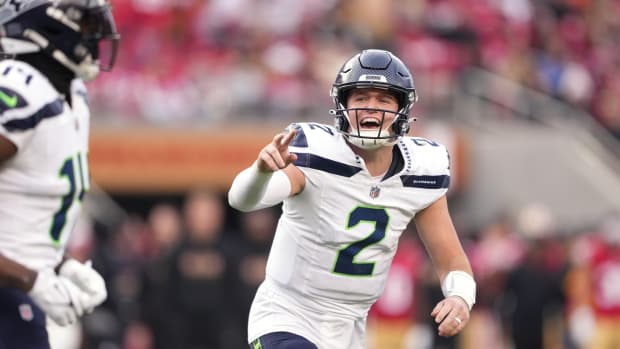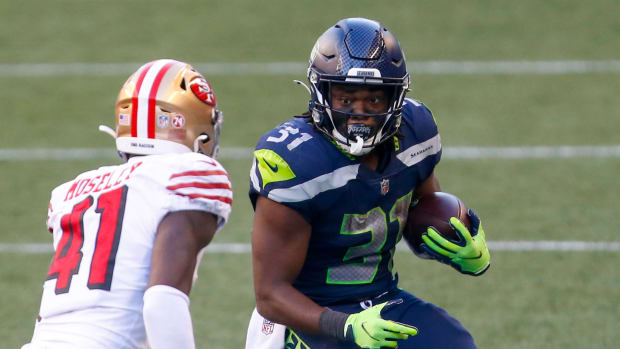Quandre Diggs, Seahawks Encourage Americans to Exercise Their Right to Vote in November
Football isn't the only major event taking place this fall - on November 3, millions of American will decide who will become (or remain) president of the United States.
Such a decision is not to be taken lightly, but neither are the social distancing measures that make in-person voting difficult. While mail-in ballots are a safer option, President Donald Trump has adamantly made unfounded claims that they are illegitimate (despite his own request for a mail-in ballot in Florida). Despite these claims, many Americans are registering to vote and are preparing to cast mail-in ballots in the coming weeks. Research even suggests that this year could produce a "massive, once-in-a-century" turnout.
However, the NFL isn't taking any chances, as players and coaches have teamed up to illustrate the importance of this hallmark of American democracy. In a video produced by the NFL Votes initiative, Seahawks cornerback Shaquill Griffin and linebacker Shaquem Griffin ask if they can show up to 60 percent of their practices, to which coach Pete Carroll responds that he's only coaching to win 60 percent of the games anyway.
That's because voter turnout was a disappointing 58.1 percent in 2016, with the message being that 100 percent effort is expected from Seattle's players, so 100 percent civic effort should be expected from our citizens as well. To further illustrate their point, the Seahawks' win percentage was 69 percent last year compared to the Rams 56 percent, which wasn't good enough for the playoffs - and 58 percent is not good enough for any democratic election.
The Griffin Twins and Carroll are not the only Seahawks encouraging fans and fellow Americans to vote. Safety Quandre Diggs spoke candidly in a recent press conference about added responsibility clarified his civic responsibility to make his voice heard through elections.
"I just think, for me, I'm a lot more mature than I was four years ago," Diggs said. "Four years ago, when I was 23, I didn't know too much about absentee voting and things like that but now, I'm a father, I'm a boyfriend of eight years, I'm a son. My mom, my girlfriend, my daughter, those people are depending on me, so for me, it's my duty to go out there and go vote, so I just made it important."
Over the past four years, Diggs has been critical of a president that condemned Colin Kapernick's peaceful, democratic use of his First Amendment right of free speech, going so far as to suggest that "maybe he should find a country that works better for him." In fact, Diggs made his position on the 45th president clear back in 2016.
In 2020, Diggs plans to use his voice via voting and enact the changes he'd like to see in his society, encouraging everyone else to speak up and do the same.
"I don't like the leadership that we have now, I'm just going to be honest with you, so for me to invoke my change, it's important for me to get my vote," he said.
"I'm not telling people who to vote for - you vote for whoever you vote for - but for me, I just think it's important in these times with everything going on that your vote is important. People back in the day fought for our rights to be able to vote and I think for me, it's important for me to take advantage of those rights and do that."
Diggs' mention of voter rights is more pertinent than ever. 2020 marks the centennial of American women gaining the right to vote, a historical accomplishment for a group that had been excluded from democratic representation since America's inception. Additionally, August 6 of this year marked the 55th anniversary of the 1965 Civil Rights Act, which outlawed discriminatory voting practices adopted in a post-Reconstruction South that had continued to oppress and marginalize Black Americans after emancipation. These Southern states instituted literacy tests as a prerequisite to voting, meaning only educated individuals could vote.
While these voting restrictions were not explicitly racist, they were created with the idea that many Black Americans who lacked adequate educational access would fail those voting tests, effectively silencing their voices and impeding their right to vote.
55 years ago is not all that long ago. Diggs' parents were likely born while these laws were still in effect, and people in his grandparents' generation were subject to them. Perhaps this is why family is a primary motivator for the young father: parents have the opportunity to build a better, more equal world for their children.
The ever-humble secondary star doesn't think you have to be famous or powerful to make a difference in this world. Diggs believes that every American can affect change through voting, educating and connecting with their communities, becoming influential leaders in their own right.
"I think it's important for everybody to do their part," Diggs said. "Not just athletes, I mean entertainers, regular civilians... I think it's important for everybody to be at the head and everybody to try to lead from the front."
"I think that the athletes and the entertainers have the bigger platform, but I think everybody's platform is important. My high school teacher that's a Black lady, she can go teach in the school and let people know what she's going through in life, the bus drivers, the people working at the laundromats—anywhere, wherever you're working at, whatever you're doing in your life, you can always make an impact on somebody and let somebody know what you're going through in life."
"Of course, we've got the bigger platform, and I'll say that we have to use our platform and we've got to continue to use our platform, but people in my little town of Angleton, Texas, they can use their platform any way they have it. You can have an impact on somebody and all you have to do is leave an impact on one person every day and you can help change the world. So I think we all need to do better, and that's including myself, and and I think that's the only way this world is going to get better is if we all do better and we all collectively do it better."
Notably, some of the most famous champions for civil rights were not born into privilege - they made history books by boldly fighting for change.
15-year old Claudette Colvin was a teenager when she refused to give up her bus seat to a white passenger, inspiring the Montgomery Bus Boycotts in 1955.
A local seamstress in her church group followed in Colvin's monumental footsteps a few months later. Her name was Rosa Parks.
The minister at their local church was none other than Dr. Martin Luther King.
And in a small town in Alabama, a movement was born that would change the world and transform the lives of Black Americans in the decades to come. It is because of the work of Colvin, Parks, Dr. King, and thousands of others that the 1965 Civil Rights Act was ratified and equal rights were finally, justly, granted.
What Diggs understands is that regular civilians, like his high school teacher in Angleton, shared her life with students and inspired them, one of them growing up to be an NFL player with a massive platform. The power of her voice and the use of her platform as a teacher shaped a young Diggs in the same way that a young Colvin felt she could not move to offer up her bus seat.
"My head was just too full of black history, you know, the oppression that we went through," Colvin remembered decades later. "It felt like Sojourner Truth was on one side pushing me down, and Harriet Tubman was on the other side of me pushing me down. I couldn't get up."
In press conferences and interviews, Diggs echoes the sentiments of the patriotic Americans that paved his way, exercising his right to free speech and his power to make a difference. In a July interview with Seahawk Maven, Diggs spoke personally as to how he uses his platform as an NFL player and vibrant social media personality to promote positivity and inspire others.
"I've got to continue to keep the message going every day. I've got to continue to put something on my social media, someway, somehow, I've got to continue to speak out, I've got to continue to help my community. I've got to continue to go back home, help my young kids grow up the right way, I've got to continue to preach to people on voting. I've got to continue to educate myself on what to vote for and who to vote for, who to vote against. I think one thing we all have to do is look into the mirror and look at ourselves and see: are we doing the best thing that we can do to keep this thing going, and doing the best thing to help this world out and better ourselves as a country?"
For all Americans, doing the best this November means exercising a hard-won right - the very least we can do is show up.
